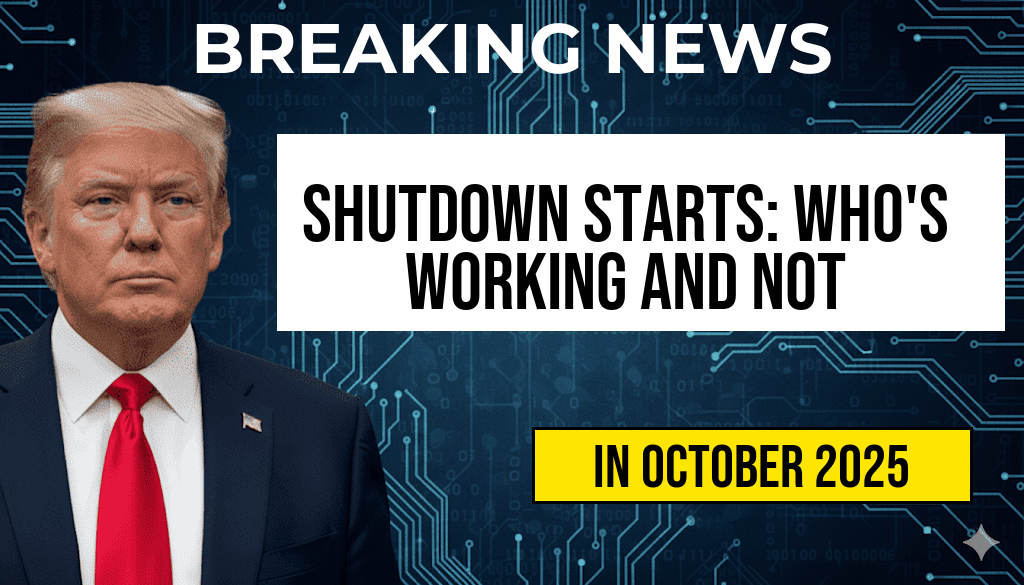The federal government has officially entered a partial shutdown as funding lapses amid ongoing political disagreements over appropriations. While essential services like national security and public safety are maintained, numerous agencies face significant operational disruptions. Key departments—including Social Security, the Internal Revenue Service (IRS), the Department of Defense, and the Transportation Security Administration (TSA)—have outlined which functions will continue and which will halt during this period. The shutdown underscores the complex interplay between legislative negotiations and the federal machinery, impacting millions of Americans relying on government services. This article provides a comprehensive, agency-by-agency breakdown of the shutdown’s immediate effects, highlighting critical areas affected and those maintaining continuity.
Federal Agencies and Their Operational Status During the Shutdown
Social Security Administration
Despite the government shutdown, the Social Security Administration (SSA) has committed to processing benefit payments without interruption. Most SSA employees involved in critical functions, such as issuing Social Security checks and handling urgent beneficiary inquiries, remain on duty. However, many administrative offices and in-person services are temporarily closed, affecting individuals seeking face-to-face assistance or applying for new benefits. Claims processing for disability, retirement, and survivor benefits continues online and via phone, but some non-essential services face delays.
Internal Revenue Service (IRS)
The IRS has designated most of its core functions as essential, ensuring that tax refunds and critical processing continue. However, many support functions, including audits, correspondence, and taxpayer assistance centers, are suspended. During the shutdown, IRS staff tasked with customer service and outreach are furloughed, complicating efforts for taxpayers needing assistance or submitting documents. The agency has indicated that e-filing and refund processing will proceed, but delays are anticipated for non-urgent inquiries.
Department of Defense
The Department of Defense (DoD) maintains a core cadre of personnel to protect national security and support ongoing operations. Active-duty military personnel, including those involved in combat readiness and critical logistics, remain on duty. Civilian employees involved in essential functions, such as missile defense and intelligence, continue working. Conversely, administrative staff, many contractors, and non-essential civilian employees are furloughed, halting routine administrative operations and delaying non-urgent projects.
Transportation Security Administration (TSA)
The TSA has declared its airport screening staff as essential personnel, ensuring the uninterrupted operation of security checkpoints across U.S. airports. Travelers should expect no immediate disruptions in airport security processes. However, some administrative support staff, training programs, and public outreach activities are temporarily suspended. The agency emphasizes that the safety and security of air travel remain the top priority, with minimal impact expected on passenger screening.
Other Notable Agencies and Services
- Centers for Disease Control and Prevention (CDC): Continues critical functions related to public health emergencies, but many research and administrative activities are halted.
- Federal Emergency Management Agency (FEMA): Maintains emergency response capabilities, though disaster recovery programs experience delays.
- National Park Service: Most parks are closed or operate with limited staff, affecting tourism and maintenance.
- U.S. Postal Service: Continues operations as a semi-independent agency, unaffected by the shutdown.
Impacts on the Economy and Public Services
| Agency | Essential Services Operational | Services Suspended or Delayed |
|---|---|---|
| Social Security Administration | Benefit payments, urgent inquiries | In-person visits, new benefit processing |
| IRS | Refund processing, online services | Audits, correspondence, taxpayer support |
| Department of Defense | Military operations, critical logistics | Civilian administrative functions |
| TSA | Airport security screening | Administrative and training activities |
The shutdown is expected to slow economic activity, particularly in sectors dependent on federal operations. Delays in processing tax refunds and administrative services may impact individual finances and small businesses. Additionally, delays in federal procurement and contract processing could ripple through various industries, complicating ongoing projects and supply chains.
Legislative Response and Outlook
Lawmakers are engaged in negotiations to end the impasse, with discussions centered on funding levels and policy provisions. Historically, shutdowns have been temporary, with services resuming once agreements are reached. However, the prolonged uncertainty can erode public trust and strain government operations. Citizens are encouraged to check official agency websites for updates on service availability and to plan for potential delays.
For further details on federal agency operations and the shutdown’s implications, readers can consult resources like the Wikipedia entry on U.S. government shutdowns or official statements from the USA.gov shutdown information page.
Frequently Asked Questions
What agencies are affected by the government shutdown?
The government shutdown impacts numerous agencies, including Social Security, IRS, Department of Defense, and TSA. While some essential services continue, many non-essential programs and employees face furloughs.
Will Social Security payments be affected during the shutdown?
No, Social Security payments will continue to be issued as usual during the shutdown since it is considered an essential service. Beneficiaries can expect their payments without interruption.
How does the government shutdown impact the IRS and tax services?
During a government shutdown, the IRS may reduce operations, leading to delays in processing tax refunds and limited access to customer service. However, critical functions related to tax enforcement typically continue.
Are defense and TSA personnel working during the shutdown?
Defense and TSA personnel are generally considered essential workers, so they continue to work during the shutdown to ensure national security and transportation safety, respectively.
What should I do if I have a government service emergency during the shutdown?
If you experience a government service emergency, contact the relevant agency directly or seek assistance through emergency channels. Essential services remain operational, but non-essential services may be temporarily unavailable.










